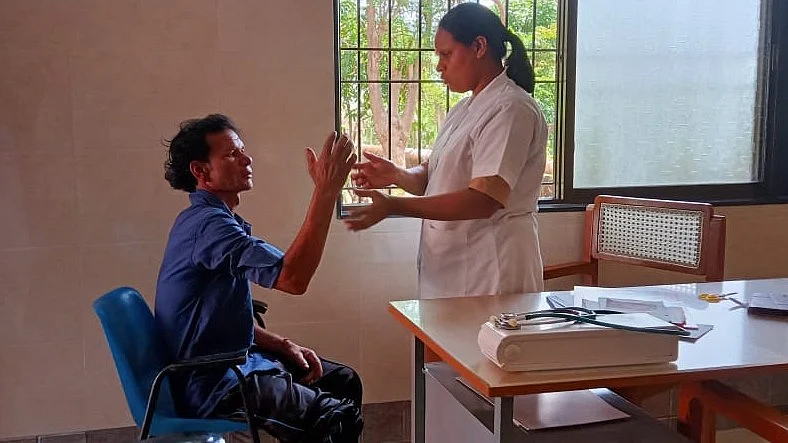Call assembly session or enact ordinance to remove discriminatory laws against leprosy patients: SC
There might be more than 145 offending state legislations, including as a reason for divorce, the Supreme Court noted

The Supreme Court on 30 July, Wednesday, called upon the states to summon special one-day assembly sessions or enact an ordinance to amend discriminatory, derogatory and demeaning provisions in various laws against leprosy-affected persons.
A bench of justices Surya Kant and Joymalya Bagchi said the Centre and states will be doing great service to these people by removing such discriminatory and demeaning provisions of law.
"States can call upon a special assembly session or a one-day session instead of waiting for a regular monsoon session or winter session and remove or amend the discriminatory provisions against leprosy-affected persons.
"Where it is not possible to call for a session, an ordinance can be enacted. The state government will be doing great service to them," the bench said.
The top court was dealing with a batch of PILs, including one initiated in 2010, in which the bench had earlier directed the states to form a committee to identify provisions in various laws, etc., which discriminate against leprosy-affected persons or cured survivors and to take steps for their removal so that they conform to constitutional obligations.
Earlier, the court had said it was informed that there might be more than 145 state legislations where such objectionable provisions were still subsisting.
The apex court on Wednesday urged the states to take remedial action and said, "It has been brought to our notice; now let's take remedial action. It is not the court's job but the state governments' to do it."
The bench asked the states, which have not filed the status report, to do so by October and said the National Human Rights Commission, which is also dealing with the issue, may submit a report with due permission from the chairperson.
Additional advocate general Garima Prashad informed the bench that the Uttar Pradesh government has identified three laws which need to be "corrected".
Similarly, Uttarakhand and Rajasthan government lawyers submitted that they have filed their status reports and identified a couple of laws and necessary actions have been taken.
"The most serious of all... we don't want to use the word but see how embarrassing it is... leprosy was one of the grounds for taking divorce", Justice Kant told additional solicitor general Aishwarya Bhati.
The top court also sought a response from the Centre and its status report on the issue.
On 7 May, the top court noted that these provisions are of wide range, illustratively, from prohibition against holding elected offices to leprosy being a ground of divorce before the family laws came to be amended by the Parliament, during pendency of these proceedings, through the Personal Laws (Amendment) Act, 2019, which came into force with effect from 21 February 2019.
"We are informed that there might be more than 145 state legislations, besides some regulations/ rules/ bye-laws/ executive instructions operating in different fields, where the offending provisions are still subsisting," the top court had said.
The court said it is not sure as to how many states have taken it seriously and earnestly and have taken any effective step to remove the offending and discriminatory expressions from their state laws so as to bring them in conformity with the Constitution.
"We, therefore, deem it appropriate to direct the chief secretaries and the law secretaries of all the states to immediately constitute a committee of three officers from the law and justice department of each state, preferably to be headed by an officer in the rank of principal district judge," the bench had said, and directed that the states may request the chief justice of the high court to provide an officer in the rank of district judge for a short duration (on deputation).
It had said the committee shall identify all the state laws, pre or post Constitution, where the discriminatory expressions related to leprosy-affected or cured persons are still part of the statute book and such regulations, statutory rules or bylaws where similar provisions have been incorporated, shall also be identified.
The petitioners, including the Federation of Leprosy Organisation (FOLO) and legal think-tank ‘Vidhi Centre for Legal Policy’, have contended that over a hundred provisions existed, both in central and in state laws which discriminated against persons affected by leprosy in ways that caused stigmatisation and indignity to them.
The PIL filed by Vidhi Centre for Legal Policy in 2017 contended a provision of the Orissa Municipal Corporation Act, 2003, disqualified a person affected by leprosy from contesting elections for the post of corporator of the Municipal Corporation on account of his or her affliction by leprosy.
Similarly, the PIL said the Rajasthan Panchayati Raj Act, 1994, disqualified a leprosy victim from contesting elections for the post of a Panch or any other member of the Panchayati Raj Institution.
Follow us on: Facebook, Twitter, Google News, Instagram
Join our official telegram channel (@nationalherald) and stay updated with the latest headlines
